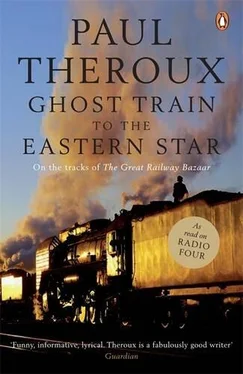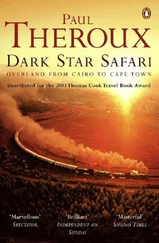I wished Istvan luck and plodded on, making a detour at a sex shop. Acting on my theory that a country's pornography offers the quickest insight into the culture and inner life of a nation, and especially the male character, I went in and assessed the goods. It was grubby stuff, which included bestiality (dogs and women), very fat people, very hairy people, a sideline in gay cruelty, and every German perversion.
Like Czechoslovakia, Bulgaria, Poland, Romania, and the other countries formerly in the Soviet shadow, when Hungary liberalized its policies in 1989 the immediate effect was the sanctioning of what had been regarded as antisocial behavior — porno, loud music, vocal complaints, and graffiti, which had been obvious from the walls I had seen on the outskirts of Budapest. Some of these promiscuous outbursts could have been dismissed as rising from irrational anger, but not porno. Pornography is specific, particular in its rituals and images, and it can't be gratuitous or faked or cooked up for its shock value, or else it won't sell. Shelves of videocassettes and DVDs of bestiality — women canoodling with dogs and horses, pigs and goats — meant that there was a market for it.
In the sleety rain and wet snow of the decaying city, amid shuffling boots (down at the heels in the most literal sense), wet faces, and stringy hair, there was no sensuality, certainly no temptation for me to linger. Nothing looked sleazier to me than another imperial city overlaid by decades of Soviet style. Yet everyone I spoke to — for I was constantly asking directions — was polite to me, every one of the fatigued, greasy-haired people, scruffy in the late-winter drizzle. I seem to be criticizing, but I liked Budapest for being in a time warp and looking left behind.
I could not identify a Hungarian face — not a national face. The heavy jaw and wide forehead and close-set eyes were not enough; yet it seemed a monolithic culture — no ethnic people, no minorities in evidence, just a lot of weary white people, relieved that Hungary had been admitted to the European Union so that they could leave and find work elsewhere and maybe never come back, as a man said to me at a café in Keleti Station when I went to reclaim my bag.
"You're going where?" he asked.
I told him Romania, and he made me repeat it because he found it so funny. He laughed a big, mocking belly laugh.
From Hungary onward, it was clear to me that very few people are looking east. There were no tourists, and the only travelers were ones going home — reluctantly, because the great wish was to travel west, to leave home. The east represented hopelessness, poverty, failure, more excuses. Most of the travelers at Keleti Station wanted to go west, even the ones who were headed east. And no one was going to Turkey.
With the drunks, the drifters, the flinty-eyed evangelists looking for sinners to convert, the moneychangers, the lurking youngsters who might have been druggies or hookers or both, and the burdened old women heading to the countryside on commuter trains, the people who held my attention at Keleti Station were the chess players. They stood at a long marble pedestal near the bumpers, in the middle of the crowd of commuters waiting for their trains to be announced. Or perhaps they weren't going anywhere: a train station is a little democracy in which everyone has a right to exist on the presumption that he or she might be waiting for a train. These men were studying the chessboards, clawing at their hair and their beards, now and then making a move — the slow and graceful logic of chess at the center of railway pandemonium.
***
THE PASSENGERS WHO BOARDED the Euronight, the express to Bucharest, were Romanian — I was traveling against the prevailing current of people headed west. Who would take the train to Romania if they didn't have to? I was told that in recent years foreigners who wished to adopt Romanian orphans took this train from time to time, but because so many adoption agencies were fraudulent, fewer outsiders were willing to risk what might prove to be a disappointment.
I liked the way this train journey was removing me from things I knew, replacing them with the distortions of the foreign — the dream dimension of travel where things are especially strange because they look somewhat familiar. Fewer people, too, as though no one wanted to go where I was going, especially now, in the muddy landscape of Hungary, the drizzle crackling into the wet clumps of snow by the tracks.
Even here, still in Europe, I sensed an intimation of Asiatic ambiguity in the cat-stink of the sleeping car, the unsmiling crowd suffering in second-class hard seats, the clutter of the dining car: piles of fluorescent tubes in cardboard boxes and coils of wire stacked on the tables, with sticky cruets of vinegar and bottles of sinister sauce, their caps clotted with spilled and dried gunk.
Racing into the darkness and the downpour, dramatic weather smothering the tracks, whistle screaming, this train is perfect, this sleeper is a cozy throwback, I was writing in my notebook. It reminded me pleasantly, in sepia tones and inexpensiveness (about $100), of my previous trip. I had taken a diesel through Belgrade and Nis and Sophia before, but so what? This was not much different — sullen men in track suits, women in shawls, tired glassy-eyed children shivering in small wet shoes.
As on the previous night en route to Budapest, the sleeping-car conductor punched my ticket, brought me beer, made my bed, and reminded me that we'd be in Bucharest around nine the following morning.
"Why you go Bucharest?"
"To look around," I said. "And then leave."
"You airplane home?"
"I change trains. To Istanbul."
"Istanbul very nice. Good business. Good money."
"What about Bucharest?"
"No business. No money." The conductor made a clown's mocking face.
"Is there a dining car on this train?"
"Everything — for you!" When he winked at me I could see that he was tipsy.
Rain was smacking the window, the train swaying as most trains do, seeming to describe an elaborate detour around the back of the world. I was going the old way, as I had long ago, and there was hardly any difference — Budapest had had the strained and uncertain and unstylish look of the seventies.
Even though no one advertised a trip like this, it had not been much trouble to find this antique railway experience — railways and buses were how the poor traveled in much of eastern Europe. Most tourists going to Romania, if they went at all, would take a short-hop plane. European airfares were very cheap because they were based on fuel that was sold untaxed. Someday soon a fuel tax would be imposed, airfares would reflect their true cost, and this train would be valuable again. Well, it was valuable now — the sleeping car almost full and the rest of the train crowded.
A sudden station loomed, blobs of fluorescence in the darkness, the storm sweeping down, bursting in oversized drops on an unsheltered platform, the right texture of raindrops for this dark, creaking night train. The weather looked old-fashioned, so did the leaky roof of the station, the puddles in the ticket lobby, the wet benches, the utter emptiness. No one got on or off: just a station sitting in the dark — I saw it was Szolnok, on the Tisza River — and after that we were really benighted.
***
REMEMBERING THE CONDUCTOR'S WINK, I went in search of the dining car, walking through the passageway of the dark tipping train making anvil clangs in the night.
And when I found it I thought: Just at the point in my life when I'd imagined that all travel was a homogenized and bland experience of plastic food and interchangeable railway cars and waiters in fast-food caps, I stumble into the dining car of the Euronight to Romania and find three drunken conductors and a man (who turned out to be the chef) in a greasy sweater with a torn bandage unraveling on his hand, all of them playing backgammon in the bad light, drinking beer, and smoking. No one was eating, and when the chef blew his nose messily he looked as if he were using a rag that had just wiped a dipstick.
Читать дальше












